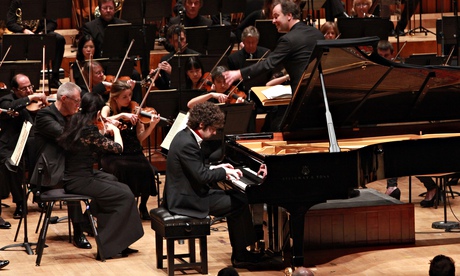
Sakari Oramo’s ongoing Nielsen cycle with the BBC Symphony Orchestra has reached the Third Symphony, the “Sinfonia Espansiva”, completed in 1911, and a difficult piece in some respects. The title refers to its mood, not its length. Comparatively short, and almost classical in its concentration, it espouses a relentless optimism and faith in progress that forms a startling contrast both with the gathering unease expressed by Nielsen’s contemporaries and the tensions and anguish of his own later work.
You either like it or you don’t, but there was no doubting Oramo’s commitment to the score, nor the ferocious sweep of the BBCSO’s playing. The soprano and baritone solos that crisscross the static harmonies of the andante were impeccably sung by Lucy Hall and Marcus Farnsworth. Nielsen dubbed the last movement the apotheosis of the working man, and Oramo ensured that its lofty melody, echoing the finales of Beethoven’s Ninth and Brahms’s First, had a tremendous nobility that never turned grandiloquent.
It was eclipsed, however, by what preceded it. Oramo opened with The Dryad, a Sibelius rarity, written in tandem with his complex Fourth Symphony, and just as disorienting in its harmonic irresolution. The concert’s centrepiece, meanwhile, was Rachmaninov’s Third Piano Concerto, with Federico Colli as soloist, a late replacement for Yevgeny Sudbin. Winner of the 2012 Leeds piano competition, Colli has had the concerto in his repertory for some time, though its notorious difficulty makes any performance at short notice an immense challenge. Colli’s technical prowess proved awesome from the outset, though it was not until part-way through the opening allegro that he began to develop the corresponding expressive subtlety. What followed, however, was stupendous, exploring the grandest of passions in the intermezzo, and closing with one of the most electrifying accounts of the finale I can remember.

